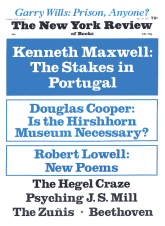NOT CLEARED OF KILLING
(Boston Globe, February 17, ’75)
The convicted abortion surgeon
and his Harvard lawyer are Big League,
happy, unpopular men lost today in the clouds
above the friendly Municipal Court—
one smear of sunlight multiplied
on the long, severe tier of windows,
the new brick edged like a razor…
the Law
is a sledge-hammer not a scalpel.
The Court cannot relive
the mis-step of the motionless instant—
So many killers have been cleared of murder,
we are surprised a fetus can be murdered—
translucence looming to attention
in bilious x-ray…
too young to be gladdened
by our old New England hope of heaven,
alone made palatable
by a certainty of hell.
A germ—
no cross in the debt-book
says it lived.
When the black arrow arrives on the silver tray,
the fetus has no past,
not even an immovable wall of paintings…
no room to stir here,
no breathless servility,
overacting our last day
writhing like a worm
in the violet ray of science—
our fierce scared eyes,
our call to wife or sister,
when we wake to our age,
to find our hearts enlarged,
all men our brothers…
hypocrites pretending to answer
what we cannot hear.
The fetus, the homunculus—
already at four months one pound,
with shifty thumb in mouth
dies,
with no new generational memory to bury…
our little model, our little God,
everywhere invisible.
How much we carry away with us
before dying,
learning like the unborn
we had nothing to take.
As I drive on, I shift my eyes;
the focus is spidered,
winter trees,
blackened concrete stores
bonneted for Easter with billboards,
snow shrinking like a yellow surgical bandage—
the slut of struggle.
The girl on the billboard
would have teased my father—
unkillable, uncatchable,
disused as the adolescent tan on my arm…
a model, she has not lost her looks—
unborn
a generation too young for any buyer.
1938—1975
1938, our honeymoon train west,
Munich, the boy beside us
leafing the revolutionary Thirties’
poems of Auden till our heads fell down,
swaying with the comfortable
ungainly gait of obsolescence…
I miss more things now,
am more consciously mistaken—
I see a girl reading Auden’s last book.
She must be very modern,
she diagnoses him in the past tense.
He is historical now like Munich.
She breathes his lost urgency…
his apocalypse he lived to loathe
with monologued assertion
and the mischievous eccentricity of age.
In the unfinishable, revolutionary now,
everything ends and nothing begins—
the devil survives his hollow obits
and hobbles cursing from his demolition.
We fear the past,
its habits squashed like wax,
regurgitation
like spots of greasy yellow buttercups…
the acid without outrage:
cavalier blacks who packed
their small African dump and graveyard
to suffocation with statues,
Victorias, Kitcheners, Irish mafia
drained white by rule and carved in soap.
Kipling mercenaries—
like a great actor, they were tortured
by the unfulfillment of their intention.
They left no ruin but their language.
We feel the machine slipping from our hands,
as if someone else were steering;
if we see light at the end of the tunnel,
it’s the light of the oncoming train.
We thought we were dead, and our spirit carried on.
AN EAR OF CORN
At the head of his table,
the wine baron
is old like Stravinsky—
there’s green on the bread;
the beautiful girls he knew
are old maids or dead.
He is drunk on his own wine;
hundreds of servants fill 14 glasses
in chronological vintages
to incantations of the price.
“It’s a sacrilege for me to say it…
they mustn’t hear me…
the best drink is a rum-banana daiquiri!”
He is not lacking in love,
someone’s young wife is on his right—
“Have you ever returned to a childhood house
and found it unchanged?
It makes one so angry…it’s so shrunk,
one wishes it wiped out—if it is wiped out,
that, of course, is another kind of catastrophe.”
The girl hears, and feels maternal;
his eyes never leave her lips.
She can’t exorcise his hallucination
he can bribe or stare
a girl he wants into orgasm…
He fills her ear
with his old sexual gramophone.
Like Belief,
he makes nothing happen.
He, she, or she or she—
she is a stream,
one of the bubbles…one of the sparks
that flash from the miscellaneous dish
he gobbled.
Her face is delicate and disgusted,
as if she had been robbed, raped,
repudiated by her mother—
a discarded ear of corn
lying by the sink,
leaf and cornsilk flipped back to show
the golden kernels are brown—
his first image of the girl who refused.
His great lethargy calms him:
hypnos and hydor,
sleep and water;
he no longer asks that she love him.
Is this the substance hoped for,
after a grasshopper life of profit—
to stand shaking on fine green legs…
to meet the second overflowering of Eros—
himself younger in each young face…
to see in that mirror
a water without the life of water,
a face maturing
to less generosity than it had?
This Issue
May 29, 1975



